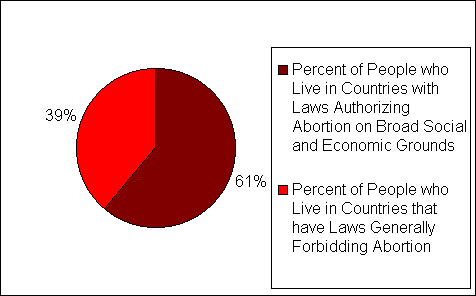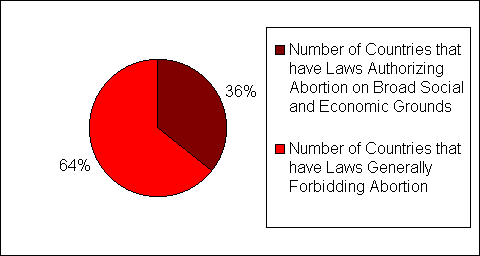
WASHINGTON -- Most of the world's women live in countries where abortion is legal, but this is still an issue that sparks controversy even decades after the courts have ruled.
About 61 percent of the global population lives in the 54 countries that have laws authorizing abortion on broad social and economic grounds; the other 39 percent are in the 97 countries that generally forbid abortion, according to the pro-abortion Center for Reproductive Law and Policy in New York.


While the topic has a lower profile in western Europe, abortion has still spurred debate, notably in predominantly Roman Catholic countries like Italy and France.
In Italy, abortion on demand during the first three months of pregnancy has been legal since 1978, but the issue can provoke strong sentiment, as it did in 1993 when a 29-year-old cancer patient refused treatment for fear of damaging her unborn child and died three hours after giving birth.
The case drew praise from the Italian press and the Roman Catholic church and prompted one bishop to call for a ban on abortion.
France has had provisional legal abortion since 1975, and the law became permanent in 1979, so that in the first 12 weeks of pregnancy, any woman declaring herself in "distress" may have an abortion, after counseling and a one-week wait.
In Britain, abortion has been legal for 30 years, and the latest controversy there is over weakening protections for life regarding first-trimester abortions. The law requires two doctors to agree to an early abortion, but Health Secretary Frank Dobson suggested Monday that this stipulation should be removed.
Other European nations, including Switzerland and Denmark, do not consider abortion to be a contentious issue, and in some former East Bloc states, notably Hungary, abortion has long been available legally.
But in Poland, legislators last month restored a positive right to life law and scrapped a 1996 law that had allowed abortion.
In Colombia, as in much of Latin America, abortion is illegal. Peru bans abortion except in cases where it would save the life of the woman, and the issue is not publicly controversial.